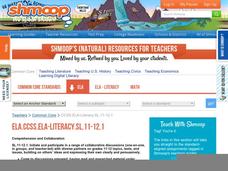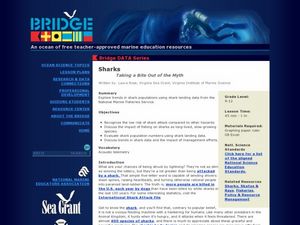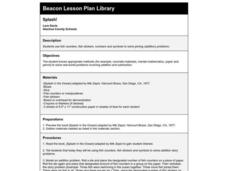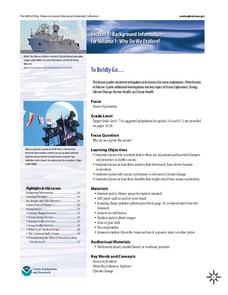Curated OER
Contents and Index
It's important for your readers to understand features of informational text such as index and table of contents, so give them this visual activity to get started. They read a brief explanation of informational text, then look at an...
Georgia Department of Education
Exploring Poetry and Poets
Combine the study of poetry and non-fiction texts with this complete and ready-to-use six-week unit. After reading numerous poems from local writers and compiling a personal anthology, high schoolers find and read a memoir or biography...
Shmoop
ELA.CCSS.ELA-Literacy.SL.11-12.1
You want your class to meet all of the Common Core standards, and here is one way to tackle the first speaking and listening standard. Given a theme to focus on from "How Much Land Does a Man Need?" by Leo Tolstoy, small groups come up...
EngageNY
Mid-Unit 3 Assessment, Part 2: Explaining How New Information Connects to the Topic
Let's talk it out. Using the resource, scholars work in triads to discuss how their research has deepened their understanding about sustainable fishing. Next, pupils engage in a whole-class discussion to consider their next steps toward...
Curated OER
/sh/ Sound Work
What letters create the /sh/ sound? Have your elementary learners study the sound, write different words that use the sound in their letter boxes, and read One Fish, Two Fish, Red Fish, Blue Fish! After this mini-lesson, can your...
Curated OER
Shhhhh, She is Sleeping
The sheep on the ship was shocked by the Fish on the Shore! Can you guess which digraph we're studying? Take a look at the /sh/ sound with your young readers. Have them write words with the target sound in letter boxes, and then small...
Curated OER
Graphs to Represent a Data Set
Here are a some pre-made sets of data that kids can use to practice data analysis. There are 10 survey scenarios written out, and scholars synthesize the results of each into a bar graph. In addition to the graphing, they answer two...
Curated OER
Graphs that Represent Data Sets
Use these pre-made data sets to introduce kids to bar graphs and data analysis, and then have them take surveys on their own. There are 10 survey scenarios written out here, and scholars synthesize the results of each into a bar graph....
Road to Grammar
Uncountable Nouns
One fish, two fish! There's a noun you can count. But how do you count the water the fish are swimming in? Or the air above the water? Teach your learners about uncountable nouns and how to use them in sentences. This resource includes...
Curated OER
Sharks ~ Taking a Bite Out of the Myth
The first thing to know about this lesson is that the commercial fisheries data for the activity no longer seems to be available. That being said, there are fascinating links to other websites, some about the comparative odds of being...
Curated OER
Inductive and Deductive Reasoning
High schoolers use logical arguments and inductive reasoning to make or disprove conjectures. After observing a teacher led demonstration, students discover that the deductive process narrows facts to a few possible conclusions. In...
Curated OER
The Sun Also Rises: Concept Analysis
Considering using The Sun Also Rises as a whole-class or book circle choice? Check out this overview and interesting interpretation of Hemingway's tale.
Curated OER
Comparisons
In this early childhood math worksheet, students practice compare 2 groups of items. Students record the number of items in each box and indicate which of the 2 groups has more items.
Curated OER
Counting: 1 - 10
In this counting instructional activity, learners count the number of objects in each box up to the number 10. Students complete 9 problems total.
Curated OER
Splash!
Students listen to the book, Splash in the Ocean. Then they use fish counters, fish stickers, numbers and symbols to solve addition story problems.
Curated OER
Number Bonds to 10: Determine the missing addend
Each slide contains a group of animals and an equation that adds up to 10. However each equation is missing a number, learners attempt to determine the missing addend to revile the number of animals hiding under the cloud. A fun,...
Institute of Electrical and Electronics Engineers
Binary Basics
Back to the (binary) basics. The resource provides a simple overview of binary code and gives two different activities to introduce it to elementary and middle school learners. Classmates write and decode messages to each other in binary...
Poetry Society
Simile and Metaphor
Young poets use word cards to prompt a metaphor poem comparing to very dissimilar items.
Curated OER
Native Americans of the Chesapeake Bay: Using Primary vs. Secondary Sources
Discover the rich Native American culture that existed at the time of early European exploration into the Chesapeake region through analysis of several primary and secondary sources.
NOAA
To Boldly Go...
When we think of ocean exploration, many of us have visions of sunken pirate ships full of treasure or mysterious creatures of the deep. What really motivates deep-sea investigation? The first in a series of diverse six-part lessons...
Curated OER
Down by the Bay
Students listen to teacher read books about fish and participate in activities in order to explore how to identify bluefish. They count and graph the numbers of fish they find in simulated fishing activities.
Curated OER
Observing and Drawing Structures of Guppies and Goldfish
Students observe fish and focus on their structures. In this life science lesson, students work in a group and observe guppies and gold fish.
Curated OER
Wings and Othe Things
Learners work in groups that are engaged in different activities at different times. They watch the video "Madagascar" and collect data pertaining to the Fish Eagle's arm spam. They work together to perform mathematical computations...
Curated OER
Swimmy's Friends
Students solve problems using various strategies. For this problem solving lesson, students read the book Swimmy by Leo Lionni. Students make fish swimming patterns, measure how many goldfish crackers it takes to make a handprint and...

























